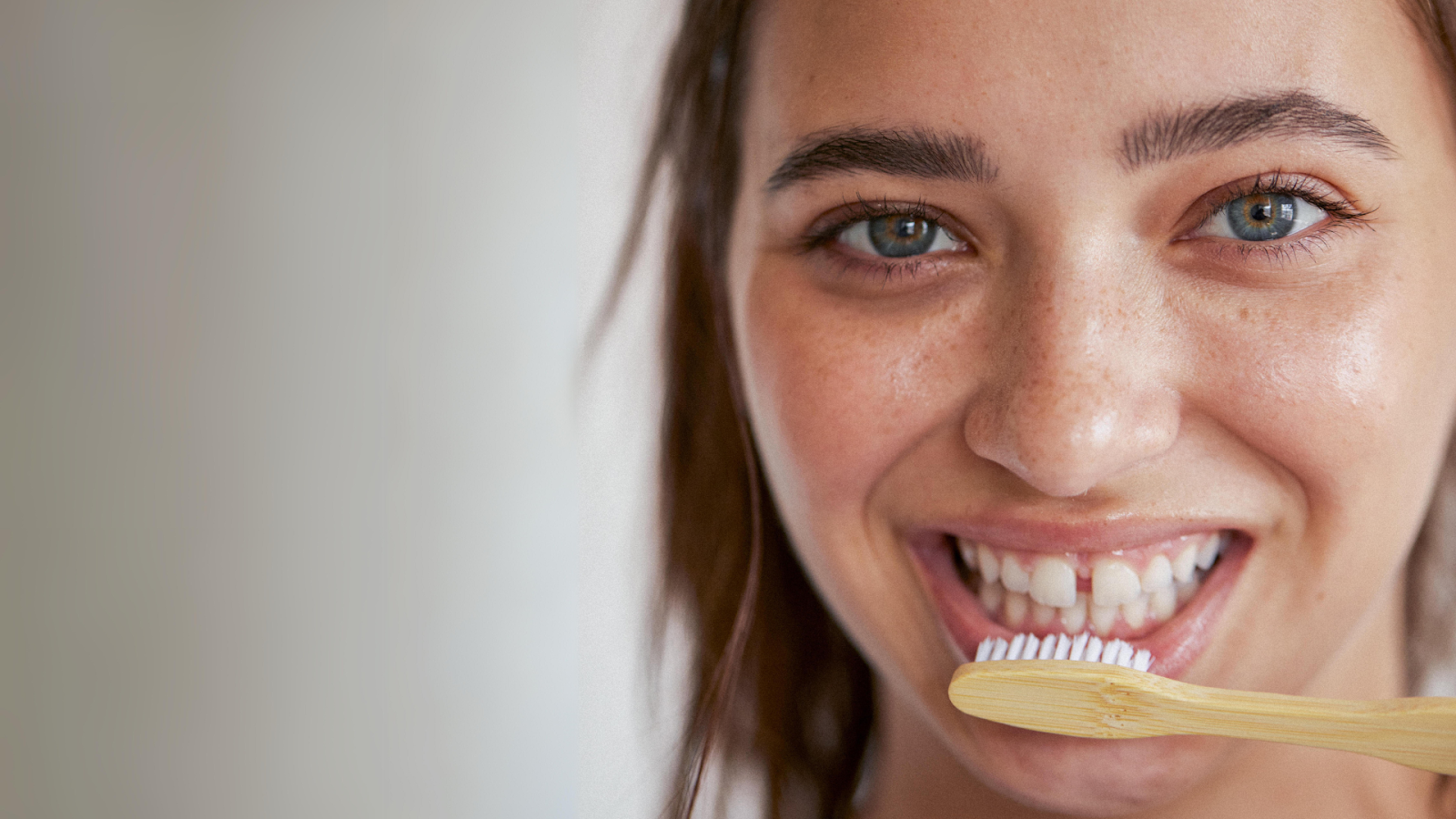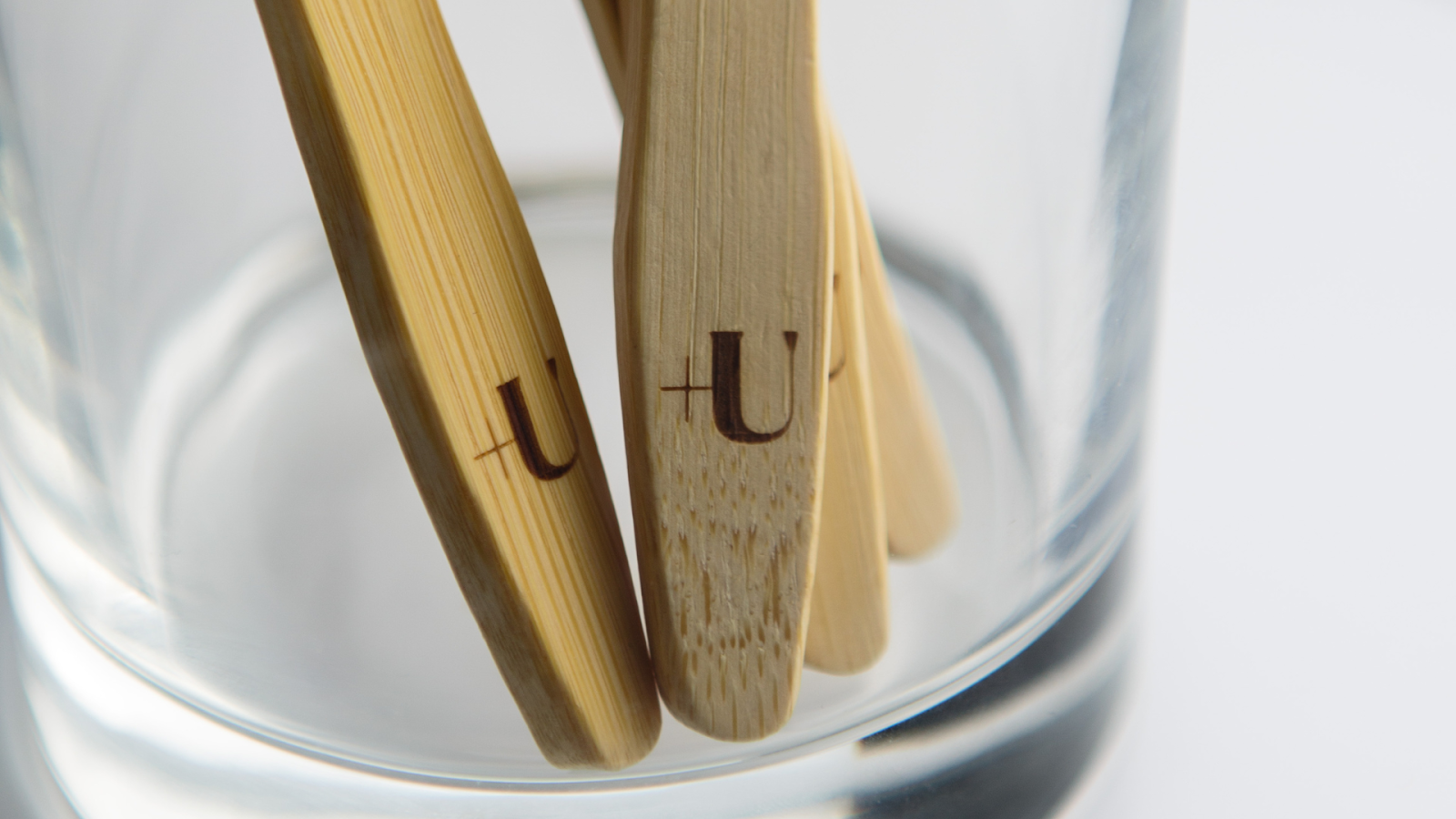Key Takeaways:
- Gentle on Gums: Soft bristle toothbrushes reduce the risk of gum damage and are recommended by dental professionals for maintaining gum health.
- Effective Cleaning: When used properly, these toothbrushes can clean as efficiently as hard bristles, ensuring a thorough clean without damaging enamel or gums.
- Suitable for Most: Soft bristle toothbrushes are an excellent choice for nearly everyone, including those with sensitive teeth, gum conditions, or dental work. Dentists recommend soft-bristle toothbrushes for all smiles. To complement your soft bristle toothbrush, Plus Ultra's Smirk Kit offers a complete package for your oral care needs.
Discover The Power Of Plus Ultra: Say Hello To Sustainable Smiles!At Plus Ultra, we proudly offer you more than just oral care products. With a strong commitment to sustainability, inclusivity, and philanthropy, our natural and beautiful products will help you take care of your smile while making a positive impact on the planet.
Join us in our journey towards sustainable smiles and make a positive impact on both your oral health and the planet. Experience the power of Plus Ultra today! |
Understanding Toothbrush Bristle Types
Choosing the right toothbrush is crucial for maintaining oral health, and the type of bristle plays a significant role in this decision. Below, we discuss the different bristle types available and how they can affect your brushing experience.
Soft Bristles
Dentists and the ADA recommend soft bristles for daily use because they are gentle on the gums and enamel. They effectively remove plaque and debris without causing damage to the soft tissues of the mouth. People with sensitive teeth or gum disease may find soft bristles particularly beneficial.
Medium Bristles
Medium bristles offer a firmer brushing experience and can be suitable for individuals without sensitivity or gum issues. They provide a more vigorous cleaning, which some may prefer for feeling a deeper clean. However, they should be used cautiously to avoid excessive wear on the enamel and gums.
Hard Bristles
Hard bristles, often labeled as "firm," are best suited for those who require extra help removing tough plaque or stains. However, dental professionals generally do not recommend them due to the risk of damaging the gums and enamel over time. If chosen, they should be used sparingly and with gentle pressure to minimize potential harm.
Benefits Of Using A Soft Bristle Toothbrush
Here are several key benefits that highlight why a soft bristle brush could be an indispensable tool for your daily oral care routine:
Reduced Risk Of Gum Damage
Soft bristles help maintain a healthy gum line and prevent the progression of gum disease.2 They are less likely to cause gum recession and irritation, both of which can lead to sensitivity or, in severe cases, require dental intervention.
Enhanced Plaque Removal
It might seem counterintuitive, but soft bristles can be more effective at removing plaque than hard bristles.3 Their flexibility allows them to dislodge plaque from hard-to-reach areas without exerting excessive force.
Enhance your oral care routine with Plus Ultra's Natural Toothpaste, which combines the benefits of gentle brushing with natural, effective cleaning.
Better For Sensitive Teeth And Gums
A soft bristle toothbrush can be a game-changer for sensitive teeth or gums. Soft bristles can clean sensitive areas without discomfort, making it easier to commit to a regular brushing routine without fear of pain.4
Longevity And Health Of Dental Work
Soft bristles are less likely to damage dental work such as fillings, crowns, and veneers. Maintaining the integrity of these restorations is crucial for their longevity and oral health.
Expert Recommendations
Dental experts endorse soft bristle toothbrushes because they also encourage proper brushing habits.1 Soft bristle brushes are more likely to be used for two minutes twice a day, as dentists recommend.

How To Use A Soft Bristle Toothbrush Effectively
Maximizing the benefits of your soft bristle toothbrush depends on employing the correct brushing technique. Follow these techniques for effective cleaning:
- Angle the brush at 45 degrees: Position the toothbrush at a 45-degree angle against the gums to allow the soft bristles to reach the plaque at the gum line and in between teeth.
- Use gentle pressure: Instead of scrubbing vigorously, use gentle, short strokes or vibrations to clean all surfaces of each tooth.
- Brush for two minutes: Spend 30 seconds on each quadrant of your mouth to ensure a complete clean, brushing for a total of two minutes.
- Don't forget the tongue: Bacteria that linger on the tongue can contribute to bad breath and dental decay. Gently brush your tongue with your soft bristle toothbrush or use a tongue scraper for a fresher mouth.
Tips For Optimal Oral Hygiene
Even the best toothbrushes don't last forever. It's crucial to replace your toothbrush every three months, or sooner if you notice the bristles fraying. After each use, ensure to rinse your toothbrush thoroughly with water and allow it to air dry to maintain its cleanliness. Additionally, don't forget to floss, as it’s essential for cleaning between the teeth, and use ADA-approved mouthwash to reach areas that brushing alone can’t reach. Plus Ultra’s Accessories can help keep your dental supplies clean, orderly, and ready for any travel.
Choosing The Right Soft Bristle Toothbrush
While understanding the benefits and proper use of soft bristle toothbrushes is essential, it's equally important to select a toothbrush that meets your specific needs and preferences.
- Bristle Pattern: Look for various bristle heights and angulations, which can enhance the toothbrush's ability to reach different areas of the mouth.
- Handle Design: An ergonomically designed handle offers a comfortable grip and better control while brushing.
- Head Size: A compact brush head may be a better choice as it can easily access hard-to-reach areas, such as the back molars.
- Quality of Materials: Ensure that the toothbrush is made from durable, high-quality materials that are safe for dental use.

Final Thoughts
Switching to a soft bristle toothbrush is a great choice for individuals looking to improve their oral health care routine. Soft bristles offer delicate yet effective cleaning, protect gums and enamel from damage, and are endorsed by dental professionals. With proper brushing techniques and regular toothbrush replacement, you can elevate your oral hygiene and enjoy a healthier smile.
For those who prefer electric toothbrushes, Plus Ultra offers an excellent solution with its high-quality, soft bristle electric toothbrush replacement heads. These dentist-recommended replacement heads not only ensure the maintenance of an optimal oral care routine but also safeguard your gums and enamel.
Frequently Asked Questions
How often should I replace my soft bristle toothbrush?
Replace your soft bristle toothbrush every three months or sooner if the bristles appear frayed.
Can soft bristle toothbrushes clean as effectively as hard bristles?
Yes, soft bristle toothbrushes can clean just as effectively as hard bristles when used with the proper technique, reaching into crevices and along the gum line without causing damage.
Are soft bristle toothbrushes good for gum health?
Soft bristle toothbrushes are excellent for gum health as they are gentle on the gums and reduce the risk of irritation and recession.
Do dental professionals recommend soft bristle toothbrushes?
Yes, most dental professionals recommend soft bristle toothbrushes for effective cleaning that's gentle on teeth and gums.
Do soft bristle toothbrushes wear out faster?
Not necessarily. The durability depends on the quality of materials and how they're used, not just the softness of the bristles.
Can anyone use a soft bristle toothbrush?
Soft bristle toothbrushes are suitable for most people, including those with sensitive teeth and gums.
Is it necessary to brush hard to remove plaque?
No, brushing hard can harm your enamel and gums. Gentle, thorough strokes with a soft bristle toothbrush are sufficient.
How do I know if my toothbrush has soft bristles?
It will usually be indicated on the toothbrush packaging. Look for the words "soft" or "extra soft."
Can I use a soft bristle toothbrush with braces?
Yes, soft bristle toothbrushes are often recommended for those with braces because they are less likely to damage the wires and brackets.
How do I dispose of my old soft bristle toothbrush?
First, remove the bristles with pliers if possible, and check your local recycling guidelines for the handle, as some toothbrush handles may be recyclable.
Sources:
- Yücel, A., Akça, A., Özcan, F., & Özcan, G. (2012). The effect of bristle stiffness on enamel surface wear. Operative Dentistry, 37(2), 129-137.
- Heintze, S., & Roué, L. G. (2012). Effect of toothbrush bristle stiffness on gingival health: A systematic review. Journal of Clinical Periodontology, 39(7), 657-668.
- Bader, D. A., & Weintraub, J. A. (2014). Optimizing toothbrush head size and bristle stiffness for superior plaque removal: A literature review. The Journal of Clinical Dentistry, 25(4), 147-152.
- Bader, D. A., & Weintraub, J. A. (2010). Toothbrush bristle stiffness and its effect on dentin hypersensitivity: A systematic review. Journal of Dentistry, 38(7), 506-512.


